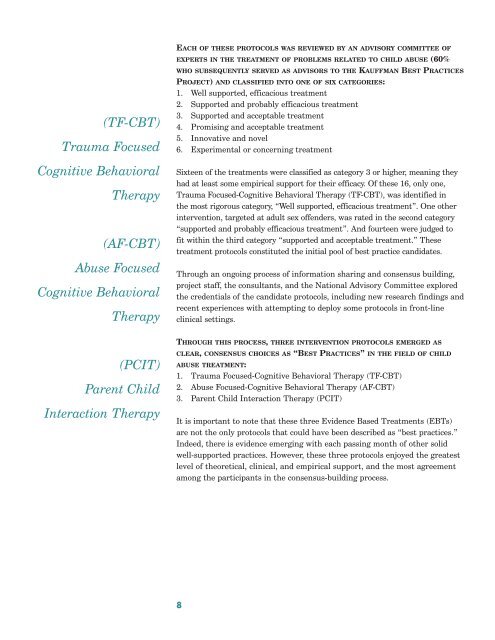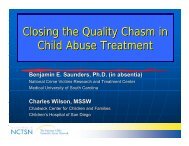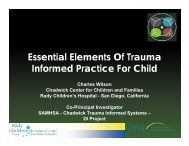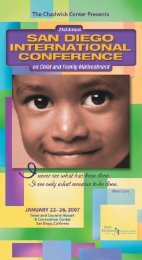Kauffman Best Practices Project Final Report - The Chadwick Center ...
Kauffman Best Practices Project Final Report - The Chadwick Center ...
Kauffman Best Practices Project Final Report - The Chadwick Center ...
You also want an ePaper? Increase the reach of your titles
YUMPU automatically turns print PDFs into web optimized ePapers that Google loves.
EACH OF THESE PROTOCOLS WAS REVIEWED BY AN ADVISORY COMMITTEE OF<br />
EXPERTS IN THE TREATMENT OF PROBLEMS RELATED TO CHILD ABUSE (60%<br />
(TF-CBT)<br />
Trauma Focused<br />
Cognitive Behavioral<br />
<strong>The</strong>rapy<br />
(AF-CBT)<br />
Abuse Focused<br />
Cognitive Behavioral<br />
<strong>The</strong>rapy<br />
WHO SUBSEQUENTLY SERVED AS ADVISORS TO THE KAUFFMAN BEST PRACTICES<br />
PROJECT) AND CLASSIFIED INTO ONE OF SIX CATEGORIES:<br />
1. Well supported, efficacious treatment<br />
2. Supported and probably efficacious treatment<br />
3. Supported and acceptable treatment<br />
4. Promising and acceptable treatment<br />
5. Innovative and novel<br />
6. Experimental or concerning treatment<br />
Sixteen of the treatments were classified as category 3 or higher, meaning they<br />
had at least some empirical support for their efficacy. Of these 16, only one,<br />
Trauma Focused-Cognitive Behavioral <strong>The</strong>rapy (TF-CBT), was identified in<br />
the most rigorous category, “Well supported, efficacious treatment”. One other<br />
intervention, targeted at adult sex offenders, was rated in the second category<br />
“supported and probably efficacious treatment”. And fourteen were judged to<br />
fit within the third category “supported and acceptable treatment.” <strong>The</strong>se<br />
treatment protocols constituted the initial pool of best practice candidates.<br />
Through an ongoing process of information sharing and consensus building,<br />
project staff, the consultants, and the National Advisory Committee explored<br />
the credentials of the candidate protocols, including new research findings and<br />
recent experiences with attempting to deploy some protocols in front-line<br />
clinical settings.<br />
THROUGH THIS PROCESS, THREE INTERVENTION PROTOCOLS EMERGED AS<br />
(PCIT)<br />
Parent Child<br />
Interaction <strong>The</strong>rapy<br />
CLEAR, CONSENSUS CHOICES AS “BEST PRACTICES” IN THE FIELD OF CHILD<br />
ABUSE TREATMENT:<br />
1. Trauma Focused-Cognitive Behavioral <strong>The</strong>rapy (TF-CBT)<br />
2. Abuse Focused-Cognitive Behavioral <strong>The</strong>rapy (AF-CBT)<br />
3. Parent Child Interaction <strong>The</strong>rapy (PCIT)<br />
It is important to note that these three Evidence Based Treatments (EBTs)<br />
are not the only protocols that could have been described as “best practices.”<br />
Indeed, there is evidence emerging with each passing month of other solid<br />
well-supported practices. However, these three protocols enjoyed the greatest<br />
level of theoretical, clinical, and empirical support, and the most agreement<br />
among the participants in the consensus-building process.<br />
8






